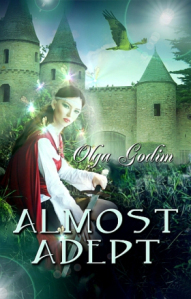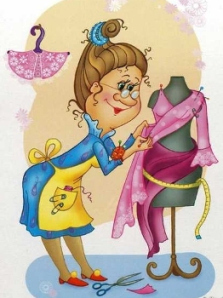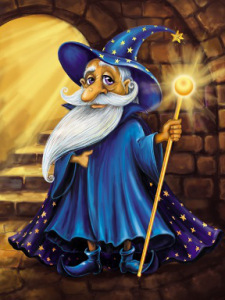Olga Godim's Blog, page 41
January 7, 2014
Almost Adept released!
On Jan 6, my novel Almost Adept hit the digital shelves. It’s available: 
• On my publisher’s website
• On Amazon
• On other online retailers’ sites
For the seventeen-year-old mage Eriale, magic is a source of joy, and she often uses her magic to solve problems. Unfortunately, such solutions sometimes get out of hand. Her latest magical caper was a disaster, so she has to leave home in a hurry but she decides to turn her shameful fleeing into a magical quest. She expects a glittering foreign escapade but ends up in Grumesh, the land rife with treachery and violence. A local courier Kealan becomes her only friend and ally. Together, they survive an explosion, a treacherous incarceration, and a daring escape. Sparks of interest ignite between them, but before Eriale can explore her attraction to Kealan, she discovers blood magic ruining amok in the city. Her priorities must change. As an aspiring Adept, she is duty-bound to find and eliminate the blood mage of Grumesh. She can’t allow her budding romance to distract her, or the blood magic will taint the entire land. No matter the cost—her life or her heart—she can’t let the vile mage win.


December 23, 2013
Kurt Vonnegut about fiction
Kurt Vonnegut’s doodle
I recently read a collection of short stories Bagombo Snuff Box by Kurt Vonnegut. Although the book was released in 1999, it contains the author’s early short stories, published in magazines in the 1950s and ’60s. It was not an easy or a fast book to read but it was powerful and it made an impression.Besides old stories it also includes a new introduction by the author, where he lists his famous 8 rules of writing fiction:
1. Use the time of a total stranger in such a way that he or she will not feel the time was wasted.
2. Give the reader at least one character he or she can root for.
3. Every character should want something, even if it is only a glass of water.
4. Every sentence must do one of two things—reveal character or advance the action.
5. Start as close to the end as possible.
6. Be a sadist. No matter how sweet and innocent your leading characters, make awful things happen to them—in order that the reader may see what they are made of.
7. Write to please just one person. If you open a window and make love to the world, so to speak, your story will get pneumonia.
8. Give your readers as much information as possible as soon as possible. To heck with suspense. Readers should have such complete understanding of what is going on, where and why, that they could finish the story themselves, should cockroaches eat the last few pages.
He also admits that most famous writers break most of his rules sometimes, except maybe the rule #1. As one critic called Vonnegut “the Mark Twain of our times,” I think it might be good idea for us, the non-famous writers, to try to abide by those rules. At least until we are famous.


December 8, 2013
Bookish Flasks
I want to share the delightful bookish flasks from http://foodriot.com/2013/11/05/bookish-flasks/. I smiled just looking. I want one – with the owl.


December 6, 2013
TED talk about story
 In 2012, Andrew Stanton gave a great TED talk about story. His advice about storytelling is as relevant today as it was two years ago. You can watch it here.
In 2012, Andrew Stanton gave a great TED talk about story. His advice about storytelling is as relevant today as it was two years ago. You can watch it here.
To refresh your memory about Andrew Stanton, here is an excerpt from Wikipedia:
“Andrew Stanton is an American film director, screenwriter, producer, and voice actor based at Pixar Animation. His film work includes writing and directing Pixar’s A Bug’s Life (as co-director), Finding Nemo and WALL-E, and his first live-action film, John Carter. He also co-wrote every film of the Toy Story franchise and Monsters, Inc.
Finding Nemo and WALL-E earned him two Academy Awards for Best Animated Feature. He was also nominated for three Academy Awards for Best Original Screenplay, for Finding Nemo, WALL-E, and Toy Story, and for an Academy Award for Best Adapted Screenplay for Toy Story 3.”


December 3, 2013
Copyright regulations
 Cornell University released a file of copyright regulations in the US – of interest to all writers and bloggers.
Cornell University released a file of copyright regulations in the US – of interest to all writers and bloggers.
Could you plagiarize a book published in the year of your birth in Albania? You can find the answer there. Could you insert poetry, written by an anonymous poet in the 1930s, into your masterpiece? The answer is there too.
Copyright Rules


December 1, 2013
Fantasy heroes – who are they?
My contemplations concern both male and female characters, but for the clarity of writing, I’m using only male nouns and pronouns.
In high fantasy, heroes are habitually princes (long-lost or deposed or otherwise beset by woes) or magicians or soldiers. Almost as often they are poor orphans or criminals: thieves and assassins. I don’t know any respectable shoemakers or tavern keepers who are heroes of high fantasy, unless their shop or farm is no more. Conversely, in urban fantasy, which takes place in the alternative version of here and now, heroes most frequently belong to the middle class: bartenders and librarians, computer programmers and dressmakers. There are not many modern fantasy novels where a hero is a ‘prince’, e.g. a movie star or a corporate mogul. Not many poor orphans either, although some pop up occasionally, just like some criminals make their appearance in urban fantasy, but in latter case, they usually work for the government. A CIA assassin – how glamorous!
Conversely, in urban fantasy, which takes place in the alternative version of here and now, heroes most frequently belong to the middle class: bartenders and librarians, computer programmers and dressmakers. There are not many modern fantasy novels where a hero is a ‘prince’, e.g. a movie star or a corporate mogul. Not many poor orphans either, although some pop up occasionally, just like some criminals make their appearance in urban fantasy, but in latter case, they usually work for the government. A CIA assassin – how glamorous!
Why such a disparity in the heroes’ social standings? Fantasy writers have a rationale for their protagonists, just as fantasy tropes are tropes for a reason. Let’s first look at high fantasy, which usually happens in a quasi-medieval society.
Princes – they have education and money, before some villain causes them to flee for their lives, rally their scattered forces, and strike back at their enemy. Princes don’t have ties to the community; nobody depends on them for their livelihood. Pretty useless creatures, princes, at liberty to go anywhere, anytime. Nobody would miss them. Magicians – they have power of their own, their magic. They can employ it in any city or society; they have no ties to the community or locality either. Quite the opposite, they are often recluses or under vows of chastity or some such. They’re free to roam at will.
Magicians – they have power of their own, their magic. They can employ it in any city or society; they have no ties to the community or locality either. Quite the opposite, they are often recluses or under vows of chastity or some such. They’re free to roam at will.
Soldiers – they also have skills they can ply anywhere. They don’t have families or links to the community that depends on them. The same applies to thieves. What is common to all those types – they are independent in their income source and nobody needs them to survive.
Orphans don’t have an independent source of income, but their ties to a place or a community have been severed by irresistible forces. As a result, they’re rootless, blown by the winds of their misfortunes to look for a good life elsewhere.
What about middle class – a shopkeeper or a peasant? Unless his shop or homestead is destroyed and his loved ones killed, he is not free. He has family to support, children to feed, village to appease. Many people rely on him – he has roots and can’t just up and leave for a heroic adventure. It would be considered irresponsible. He must work hard from dawn to dusk, fix the roof after a church service, and pay the guild fee by Friday. He doesn’t have a choice. No food for a fantasy writer there.
Now let’s take a look at urban fantasy – at our society. Here the roles are reversed. Who has the widest choices? Our shop owners and farmers and middle-level employees. Millions of choices. They can switch careers, travel, attend university, go to movies every week, meet new people in bars, gyms, interest clubs, Internet, and so on. The possibilities for fantasy adventures are countless.
How about our soldiers? They’re so boxed in by army regulations that there is almost no room to maneuver for a fantasy writer.
What about our princes and magicians – the super-rich folks and pop icons? If they don’t want to lose their money, they work hard and then drink and do drugs to unwind. At least that is what the gossip pages tell us. Paparazzi follow them, so they’re not free to go anywhere. Can they switch career? Of course, in theory, but it happens so seldom, we never hear of it. Can they become members of a knitting club in a local community center? Yes, but they don’t. Have you heard of even one example? They’re extremely restricted by their names, money, and fame. That’s why they’re almost never heroes of modern fantasy.
Did I simplify in my musing? Yes. Are there exceptions to my conclusions? Definitely. Do you know novels that contradict my findings? Argue with me.


November 28, 2013
Computers are good for all ages
 My mother sent me this picture. According to her, there is a new research out there that says computers are good for the older generation. The internet keeps their brains from deteriorating, and their loneliness is alleviated by their online friends. Their memory is also affected in the positive way. Keep up surfing the internet, grandpa!
My mother sent me this picture. According to her, there is a new research out there that says computers are good for the older generation. The internet keeps their brains from deteriorating, and their loneliness is alleviated by their online friends. Their memory is also affected in the positive way. Keep up surfing the internet, grandpa!
Cigars are extra.


November 25, 2013
Almost Adept on the way to realease #2
I got the cover art by Trisha FitzGerald. Isn’t it pretty? 
I like how she stands out with her red cape on the background of all this green and blue, and the magic swirls around her.
The sword is questionable though – my heroine never handled a sword. Magic is her weapon. I guess it works as an allegory.
At first, I wasn’t sure I liked the picture. It doesn’t reflect my image of the heroine, but it’s growing on me.


November 20, 2013
My novel precipitated the real thing!
In my novel Lost and Found in Russia, published in February 2013, two babies were accidentally switched at birth in Russia. Then, 34 years later, one of the mothers discovered the switch and began searching for her biological daughter. Imagine my surprise, when I watched this little news reel – about two babies switched at birth in Russia. I thought I made it all up.
http://www.nbcnews.com/video/nightly-news/53613825/#53613825


November 14, 2013
Almost Adept on the way to release #1
A few days ago, I got a galley proof of my novel Almost Adept from my publisher, Burst Books. All the editing has been done already, so I couldn’t do any rewrites, just check for errors and fill an errata sheet. I read it, and it made me unhappy. I would’ve written so many passages differently now, but it’s too late. Why didn’t I see those problems before? Extraneous adverbs, awkward sentences, wrong word choices. Nothing major, but details make all the difference. One of the reasons, I suppose, is that the text is in a different font and format than the version I worked on with my editor. With my second novel, I’m going to change the font during the editing process and see what jumps at me.
And I still don’t have a cover for this novel. I’m so impatient to see what the artist will come up with.






